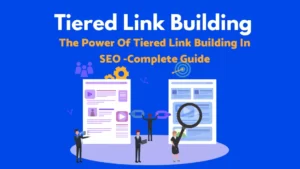
How To Do Keyword Research
Table of Contents
⚡ New here? Check out our most demanding SEO Services Now!
Have you ever wondered why some websites always pop up first when you search? It’s like magic, right? Well, the trick is called SEO optimization, which works with strong “keyword research.” Now, you might be thinking about what is keyword research and how to do keyword research. Maybe, being a blogger or digital marketer, you might be familiar with the word “keyword research” but don’t know the strategy that leads to success. Don’t worry this guide will properly teach you to do strong and result-oriented Search term research. After reading this blog you can easily provide keyword research services or can easily rank your own site. So lets begin.
What is a Keyword Research?
Keywords (KW) are like the compass that guides search engines to connect users with relevant content. Keyword research is like picking the right words and using them strategically in content to make sure your content is visible to the right audience, driving organic traffic to your website or platform.
The main purposes of doing SEO KW research are to find the right terms that your targeted customers are searching for, make a list, and give preference to the specific keywords you want to optimize for considering factors such as search volume, competition, and your business goals.
Why Is Keyword Research Important For SEO?
⚡ New here? Check out our most demanding SEO Performance Services Now!
Although you may have initial key phrase in mind to describe your products or services, engaging in key phrase research serves to refine and validate your list. SEO involves not imposing the terms you believe are pertinent onto your content but rather understanding what terms your prospective customers are actively searching for.
Through research, you might find that searchers use different terms than you originally assumed. Additionally, you may uncover new keywords that hadn’t crossed your mind, offering more avenues for a focused content strategy to expand your reach to a broader audience. Here’s why it’s so important:
1. Visibility
The right keywords make your content visible to the right audience. It’s like putting up a sign that says, “Hey, I’ve got what you’re looking for!”
2. Relevance
Keywords help you stay relevant. When you use the words people are searching for, your content becomes more useful and interesting to them.
3. Connection
Think of keywords as bridges. They connect what people are searching for with what you offer. It’s like building a direct route to your content.
4. Competition
Good KW research lets you find words that aren’t overly competitive but still bring people to your doorstep.
5. Understanding Your Audience
By researching keywords, you get to know what your audience is interested in. It’s like having a conversation in a language they understand.
How To Do Keyword Research? Step By Step Process To Search Potential Keywords
⚡ New here? Check out our most demanding SEO Services Now!
Now, you might be thinking how to find keywords on a page, so here is a detailed, step-by-step guide on conducting SEO keyword research, covering the process from generating initial keyword ideas to selecting the ones that align most effectively with your business objectives.
1. Defining Your Objectives
Effective keyword research begins with a clear understanding of your objectives. What are you aiming to achieve with your content? Whether it’s boosting website traffic, increasing sales, or building brand awareness, defining your goals will guide the entire KW research process. Tailoring your keyword strategy to align with these objectives is essential for success.
2. Identifying Your Target Audience
Knowing your target audience is key to successful keyword research. Understanding their preferences, language, and search behavior lets you choose keywords that resonate with them. Conducting surveys, analyzing social media insights, and studying competitors can provide valuable insights into the mindset of your audience.
3. Brainstorming Relevant Topics
Once you’ve identified your goals and target audience, the next step is to brainstorm relevant topics. Think about the overarching themes and subjects that align with your niche. For example, let’s say you run a fitness blog catering to individuals interested in home workouts. Your overarching theme might be “Home Fitness,” and your subjects could include “Bodyweight Exercises,” “Nutrition for Home Workouts,” and “Creating a Home Gym Setup.” These topics not only align with your niche but also cater to the specific interests and needs of your target audience—those seeking effective home workout solutions.
This process helps lay the groundwork for generating specific keywords later on. Consider using mind maps or other brainstorming techniques to visualize the relationships between different topics.
4. Utilizing Keyword Research Tools
An array of tools is available to simplify the keyword research process. Leveraging tools such as SEMrush, Ahrefs, and Google Keyword Planner can provide invaluable data on search volume, competition, and related keywords. These tools not only streamline the research process but also offer insights that manual methods may overlook.
5. Long-Tail Keywords
While short, generic keywords are highly competitive, long-tail keywords present an opportunity to tap into specific, less saturated niches. Long-tail keywords, comprising three or more words, often reflect user intent more precisely. Identifying and incorporating long-tail keywords into your strategy can enhance relevancy and attract more targeted traffic.
6. Analyzing Competitor Keywords
Studying the keywords that competitors are targeting offers a valuable shortcut to understanding your industry’s landscape. Tools like Ahrefs and SpyFu can unveil the keywords driving traffic to your competitors’ websites. Analyzing this data not only helps you identify gaps in your own strategy but also provides inspiration for new keyword ideas.
7. Identify Effective Keywords
After populating your topic buckets using SEO tools and competitive analysis, the next step is to to identify the most effective keywords for your site. It’s essential to be aware that different keyword research tools, whether free or subscription-based, employ distinct methods to calculate the values for the keyword data discussed below.
i) Search Volume
Monthly Search Volume (MSV) is a metric revealing how many people search for a specific keyword. MSV provides insight into how many individuals might encounter your search snippet on the first page of Search Engine Results Pages (SERPs). While low MSV might indicate fewer searches, it can still be strategically valuable, especially if the keyword converts a significant percentage of a smaller set of searchers.
ii) Clicks
The number of clicks measures how many people click on a search snippet link after searching for a specific term. Tools such as Ahrefs Keyword Tool can demonstrate the monthly click frequency for a website ranking for a specific keyword. Some search terms may have a low click-through rate because answers are directly provided on SERPs through Google’s featured snippet or knowledge panel.
iii) Traffic Potential
Estimating potential traffic involves combining monthly search volume and click-through rate data. Tools like Ahrefs’ Keyword Explorer can also show the amount of traffic top-ranking pages attract for a specific keyword.
iv) Keyword Difficulty
Keyword Difficulty (KD) assesses the level of difficulty in securing a position within the top ten organic search results for a specific keyword. Different tools calculate KD differently. For instance, Ahrefs uses a straightforward average of the number of websites linking back to the top-ten content, while Moz employs a more intricate formula, factoring in proprietary metrics like page and domain authority.
Choosing between low and high-difficulty keywords involves trade-offs. Easy keywords may secure a prime position on a Google search page but might attract fewer searches. On the other hand, high-difficulty keywords demand more time and resources but can significantly boost organic traffic if you reach the first page. Difficulty also indicates the demand for the keyword’s topics, potentially leading to valuable backlinks for your content as you strive to ascend the SERPs.
8. Refining Your List
After gathering a list of potential keywords, it’s time to refine and prioritize. Focus on relevance, search volume, and competition to narrow down your list to the most impactful keywords. Consider the user’s intent behind each keyword and whether it aligns with your content and objectives.
Informational: Answering queries like “what does serum do for your skin?”
Navigational: Locating specific webpages, e.g., “Beauty Trend.”
Transactional: Ready-to-buy searches, e.g., “best price on headphones.”
Commercial Investigation: Research-oriented, seeking reviews or advice.
Localization: Geographically targeted searches, often using “near me.”
9. Creating High-Quality Content
Keyword research is not just about inserting keywords into your content; it’s about creating valuable, high-quality content that resonates with your audience. Search engines prioritize content that provides genuine value to users. Creating compelling and informative content centered on your selected keywords increases the likelihood of achieving higher rankings in search results.
10. Monitoring and Adapting
The digital landscape is dynamic, and trends can shift quickly. Regularly monitoring your keyword performance and adapting your strategy accordingly is essential for sustained success.
In Conclusion
⚡ New here? Check out our most demanding London SEO Services Now!
Effective keyword research is an ongoing, adaptive process, not a one-time task. Continuous refinement ensures that your content stays relevant and resonates with your target audience. Utilize analytics tools to track changes in search volume, user behavior, and keyword rankings. Continuously analyzing data enables you to fine-tune your strategy and stay ahead of the competition.

Webio Creatives Team
WebioCreatives keeps you informed on the latest digital marketing trends and experiences that leave lasting impressions. Make informed decisions with our expert guidance.






